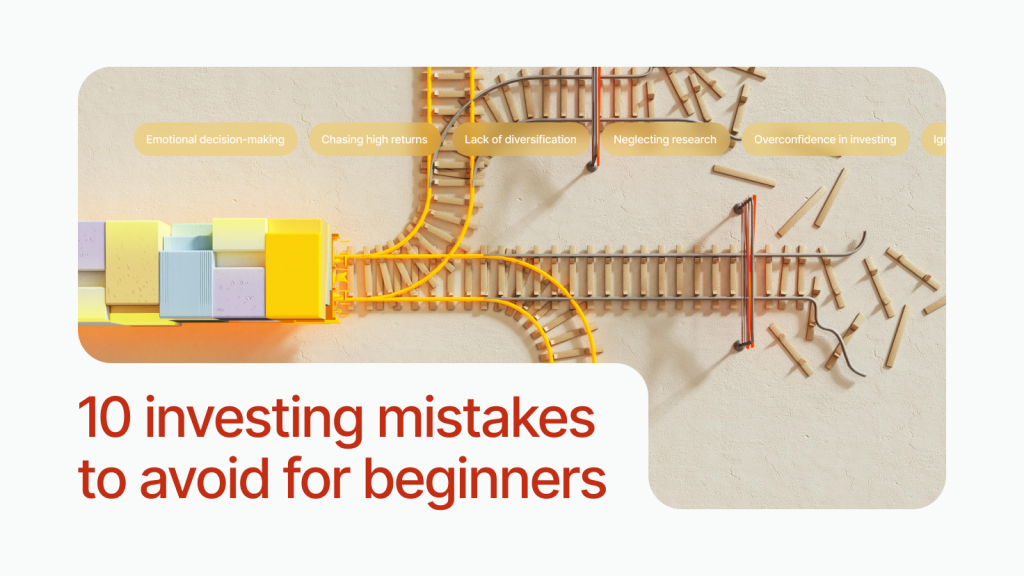Starting your investment journey can feel like an exciting, yet daunting, experience. With so many options and strategies to choose from, it’s easy to make mistakes, especially as a beginner. But don’t worry, every successful investor has been in your shoes and made some missteps along the way. The key to building long-term wealth is understanding and avoiding these common beginner investment mistakes.
In this guide, we’ll walk you through the investing mistakes to avoid for beginners and provide practical solutions for how to avoid them. By the end, you’ll be equipped with beginner investing tips to help you make smarter, more informed decisions, ensuring a solid foundation for your financial future.
Jump to section:
1. Emotional decision-making
2. Chasing high returns
3. Lack of diversification
4. Neglecting research
5. Overconfidence in investing
6. Ignoring risk management
7. Not having a long-term plan
8. Investing without understanding in fees
9. Avoiding professional advice or tools
10. Starting without an emergency fund
1. Emotional decision-making
One of the most common mistakes new investors make is letting emotions dictate their investment decisions. Markets fluctuate, and seeing your portfolio value drop can spark panic. Many, who are investing for beginners buy high out of excitement and sell low out of fear—a guaranteed recipe for losing money. This emotional rollercoaster often leads to chasing high returns in investing without considering the risks, making it one of the biggest investing mistakes to avoid.
How to avoid it:
Stick to your investment plan, no matter how volatile the market becomes. The best approach is to think long-term and avoid reacting impulsively to short-term market changes. Setting clear financial goals and aligning your investments with those goals will help you stay calm during market dips, reducing beginner mistakes in investing.
2. Chasing high returns
The temptation to go after high returns is another beginner investing pitfall. Investments that promise high rewards often come with higher risks. New investors are drawn to “hot stocks” or trendy assets without understanding the risks involved. This approach can lead to significant losses, especially if you lack a clear strategy for how to invest wisely as a beginner.
How to avoid it:
Rather than chasing high returns in investing, focus on building a solid, long-term strategy that aligns with your financial goals and risk tolerance. Diversify your portfolio with a mix of assets. The balance between high- and low-risk investments reduces the chances of significant losses during market downturns.
Start with investments that align with your financial goals and risk tolerance, and let compounding do the heavy lifting over time.
Platforms like Mintos offer access to a variety of investment options, allowing you to grow your wealth steadily while managing risk more effectively.
3. Lack of diversification
Investing all your money in one asset class is one of the biggest investing mistakes to avoid. Putting your entire investment in just stocks, real estate, or any single asset increases your exposure to market fluctuations. If that market crashes, so does your portfolio.
How to avoid it:
To avoid beginner investing pitfalls, make sure your portfolio includes a diverse mix of asset types, such as stocks, bonds, ETFs, passive real estate, and loans. By spreading your investments across multiple asset classes, you reduce the impact that any single underperforming asset could have on your overall portfolio. Diversification not only minimizes risk but also creates a more stable foundation for growth over time.
Different asset classes react to market events in unique ways—while stocks might be more volatile during economic uncertainty, bonds or real estate can provide more consistent returns.
By including a variety of asset classes, you ensure that when one sector dips, others can help balance it out, keeping your portfolio resilient. Diversification helps safeguard your investments while still offering the potential for solid returns, making it a key strategy for long-term financial success.
For more on this topic, check out our guide on portfolio diversification.
4. Neglecting research
Investing without proper research is like gambling. Too often, new investors jump into assets they don’t fully understand, relying on tips from friends, media, or social trends. This can lead to buying at the wrong time, or worse, falling for investment traps. Neglecting research is one of the most common beginner investing pitfalls and can result in significant losses.
How to avoid it:
Before making any investment, take the time to understand how it works, its historical performance, and what risks are involved. Start with the basics—how do stocks work, what are bonds, and the importance of research in investing. The more informed you are, the better your decisions will be.
At Mintos, we offer detailed information on different investment options, to help you avoid these common investing mistakes.
5. Overconfidence in investing
It’s easy to feel overconfident after a few successful trades, but this can lead to reckless decision-making. Overestimating your ability to predict the market is a common mistake that often results in losses.
How to avoid it:
Recognize that no one can time the market perfectly, not even seasoned investors. Stick to proven strategies like dollar-cost averaging or automated investing. With automated investing tools, you can rely on data-driven strategies that help reduce human error and emotional investing, keeping your portfolio aligned with your long-term goals.
If you’re wondering how to get started with investing, remember that relying on data-driven strategies reduces human error. Using these tools will help keep your portfolio aligned with your long-term goals and prevent you from falling into beginner investment traps like overconfidence.
6. Ignoring risk management
Many beginners overlook the importance of risk management in their investment strategy. Risk management involves understanding and controlling the level of uncertainty in your investments. It means evaluating how much risk you’re willing to take on and aligning your investments with that tolerance.
Failing to assess your risk tolerance is one of the beginner mistakes in investing, as it can lead to putting money into assets that are too volatile or unpredictable for your financial situation. This results in unnecessary stress and potential losses, making it crucial to focus on avoiding beginner investment traps.
How to avoid it:
Assess your risk tolerance before making any investment decisions. Are you comfortable with high volatility, or do you prefer more stable, predictable returns? Mintos offers a range of investment options that cater to different risk profiles, helping you avoid beginner investing pitfalls. Diversifying your portfolio across different asset classes can also help in avoiding investment losses by spreading risk across multiple investments.
By understanding how to avoid investment mistakes, you can make better decisions that align with your financial goals.
7. Not having a long-term plan
Many beginner investors make the mistake of not having a long-term investment plan and instead focus too much on short-term gains. This lack of direction often results in frequent buying and selling, leading to investment losses from unnecessary transaction costs and taxes.
Without a clear strategy, it’s easy to get caught up in market fluctuations, reacting impulsively to short-term market noise, and missing out on long-term growth opportunities.
How to avoid it:
Set clear, long-term financial goals before making any investment decisions. Decide whether you’re saving for retirement, building wealth, or creating a passive income stream, and use these goals to guide your investment choices. Instead of chasing short-term profits, focus on creating a balanced, diversified portfolio that can withstand market ups and downs.
By aligning your investments with long-term growth strategies, you’ll avoid the trap of trying to time the market, which is one of the most common investing mistakes to avoid for beginners. Sticking to a plan can help you manage risk more effectively, avoid emotional decision-making, and stay committed to your financial goals. Remember, beginner investing tips focus on patience, consistency, and thoughtful decision-making, rather than reacting to short-term trends or market noise.
8. Investing without understanding fees
One of the most overlooked beginner investing mistakes is underestimating how much fees can erode your returns. From management fees and transaction costs to hidden expenses, these small charges may seem insignificant at first but can accumulate over time, reducing your overall investment growth. Fees that go unnoticed can greatly hinder your portfolio’s potential, especially when compounded over years.
How to avoid it:
Before committing to any platform or investment, take the time to understand the fee structure. This includes not just obvious charges, but also any hidden costs that might arise. Opting for low-cost investments is one of the easiest ways to enhance your long-term returns. Reducing unnecessary fees is a key part of risk management for beginners and helps in avoiding investment losses caused by these often-overlooked costs.
By paying close attention to the fee structure, you’ll make smarter investment decisions that align with your strategy for sustainable growth.
9. Avoiding professional advice or tools
Many beginner investors believe they can manage their investments on their own without seeking guidance, often ignoring the benefits of using professional tools or seeking advice from experienced investors. While learning independently is essential, trying to navigate the complexities of investing without support can lead to costly mistakes, missed opportunities, and inefficient strategies that don’t align with long-term goals.
How to avoid it:
Leverage the wealth of resources available to guide your investment decisions. Whether it’s consulting with a financial advisor or using educational tools, having professional input can help you avoid common investing mistakes like improper diversification or emotional decision-making.
10. Starting without an emergency fund
One of the common investing mistakes beginners make is jumping into investments without first setting up an emergency fund. Life is unpredictable, and unexpected expenses like medical bills or job loss can force you to dip into your investments at the wrong time, leading to losses or missing out on long-term gains.
How to avoid it:
Before investing, it’s important to build an emergency fund that covers at least three to six months’ worth of living expenses. This way, you won’t have to sell your investments when the market is down or disrupt your long-term strategy. Once your emergency fund is secure, you can confidently focus on how to invest wisely as a beginner, knowing that your basic financial needs are protected.
Investing smarter, avoiding mistakes
Investing can be an incredible tool for building wealth, but mistakes, especially in the beginning, can be inevitable. Every investor makes missteps along the way—it’s part of the learning process. What matters is recognizing these common beginner investment mistakes and taking proactive steps to avoid them in the future. By approaching investing thoughtfully and being informed, you’ll be better equipped for long-term success. Whether you’re working on how to start investing safely or fine-tuning your portfolio with smarter choices, learning from these mistakes will help you make more confident decisions.
If you’re ready to invest wisely, consider using Mintos, where you can access a variety of low-risk investments, automated strategies, and diversified options tailored to both beginners and experienced investors. With the right tools and mindset, you can build a strong, resilient portfolio while minimizing the pitfalls that every investor encounters at some point.
Want to know more?
Disclaimer:
This is a marketing communication and in no way should be viewed as investment research, investment advice, or recommendation to invest. The value of your investment can go up as well as down. Past performance of financial instruments does not guarantee future returns. Investing in financial instruments involves risk; before investing, consider your knowledge, experience, financial situation, and investment objectives

